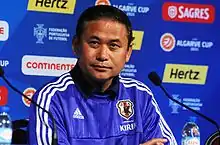Norio Sasaki
Norio Sasaki (佐々木 則夫, Sasaki Norio, born 24 May 1958) is a former Japanese football player and manager. He is the former head coach of the Japan women's national team. He served as coach of the Japan women's U-20 national team starting in 2007, and was named coach of the national team in 2008. He coached the team in the 2011 FIFA Women's World Cup, where they defeated the United States on penalty kicks to win their first FIFA Women's World Cup.[1] He retired as head coach in March 2016.[2]
 Sasaki in 2015 | |||
| Personal information | |||
|---|---|---|---|
| Full name | Norio Sasaki | ||
| Date of birth | 24 May 1958 | ||
| Place of birth | Obanazawa, Yamagata, Japan | ||
| Height | 1.75 m (5 ft 9 in) | ||
| Position(s) | Midfielder | ||
| Youth career | |||
| 1974–1976 | Teikyo High School | ||
| 1977–1980 | Meiji University | ||
| Senior career* | |||
| Years | Team | Apps | (Gls) |
| 1981–1991 | NTT Kanto | 25 | (2) |
| Total | 25 | (2) | |
| Teams managed | |||
| 1997–1998 | Omiya Ardija | ||
| 2006 | Japan Women U-17 | ||
| 2007–2010 | Japan Women U-20 | ||
| 2008–2016 | Japan Women | ||
| * Senior club appearances and goals counted for the domestic league only | |||
Playing career
Sasaki studied at and played for Teikyo High School and Meiji University. At Teikyo High School, he won the national inter-high school competition as team captain. His high school club also advanced to the semi-final at the All Japan High School Soccer Tournament.
After graduating from Meiji University, Sasaki started to work for Nippon Telegraph and Telephone and joined company club NTT Kanto. He was a midfielder/defender. He contributed to the club's promotion to Japan Soccer League Division 2 in 1986.
Sasaki retired from playing at the age of 33.
Coaching career
Sasaki served as the head coach of Japan Football League side Omiya Ardija in 1998, then took various other positions at Omiya, including the youth team head-coach and the head of development.
In 2006, Sasaki became the assistant coach of Japan women's national football team, as well as the head coach of its U-20 team. In 2008, he was promoted to the head coach of the national team, succeeding Hiroshi Ohashi.
Under Sasaki's reign, Nadeshiko won the EAFF Women's Football Championship in 2008 and again in 2010. He also led the Japan Women to a fourth-place finish at the 2008 Summer Olympics in Beijing.
Sasaki and his team won the 2011 FIFA Women's World Cup, which upset host nation Germany and then Sweden to reach the tournament final, and beat the United States 3–1 in a penalty shoot-out in the final. Nadeshiko became the 19th recipient of Japan's People's Honour Award for winning the World Cup. On 9 January 2012, Sasaki was awarded the Women's Best Coach Award in the 2011 FIFA Ballon d'Or.[3]
At the 2012 Summer Olympics, Sasaki led Japan to their first Olympic medal, a silver, after reaching the final but losing 2–1 to the United States in the final.
At the 2015 FIFA Women's World Cup in Canada, Sasaki, who attempted to become only the 2nd coach since Vittorio Pozzo's Italian team 77 years ago to win two FIFA World Cup finals, oversaw a 2nd-place effort, as the Japanese lost 5–2 to the US in the final.
At 2016 AFC Women's Olympic Qualifying Tournament, following Japan's failure to qualify for the 2016 Olympics in Brazil, Sasaki stepped down as head coach of the team.[2] He was succeeded by Asako Takakura.
Honours
Managerial honours
- Japan Women
- EAFF Women's Football Championship: 2008, 2010
- Asian Games: 2010, Runner-up: 2014
- FIFA Women's World Cup: 2011, Runner-up: 2015
- Olympic Silver Medal: 2012
- AFC Women's Asian Cup: 2014
- Individual
- AFC Coach of the Year: 2011
- FIFA World Women's Coach of the year: 2011
- Japan Football Hall of Fame: Inducted in 2019
- Decorations
- People's Honour Award: 2011
References
- なでしこジャパン(日本女子代表チーム)新監督に佐々木 則夫氏が就任! (in Japanese). Japan Football Association (jfa.or.jp). 7 December 2007. Retrieved 13 July 2011.
- "Sasaki steps down as Japan coach after Rio failure". Equalizer Soccer. 10 March 2016. Retrieved 1 June 2016.
- "FIFA Ballon d'Or: Norio Sasaki". fifa.com. FIFA. Retrieved 12 October 2012.